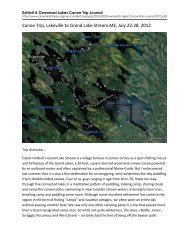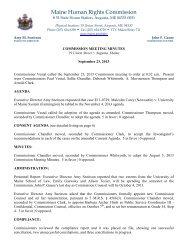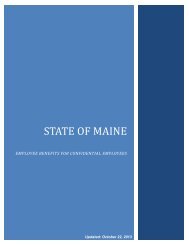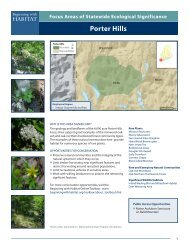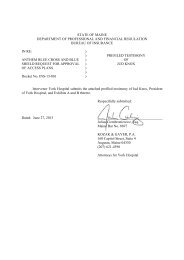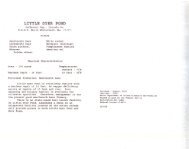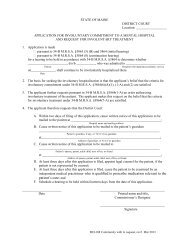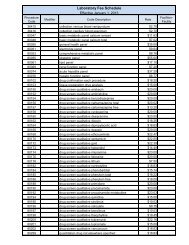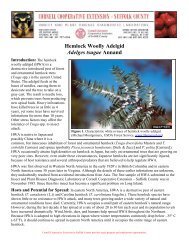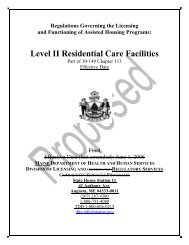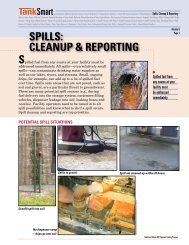- Page 7 and 8:
THE MAINE BUGLE. Entered at the Po$
- Page 9 and 10:
Losses in the First Maine Heavy Art
- Page 11 and 12:
CHARGE OF THE HEAVY ARTILLERY. 5 pe
- Page 13 and 14:
CHARGE OF THE HEAVY ARTILLERY. 7 fi
- Page 15 and 16:
LOSSES OF THE HEAVY ARTILLERY. 9 Co
- Page 17 and 18: LOSSES OF THE HEAVY ARTILLERY. \\ N
- Page 19 and 20: LOSSES OF THE HEAVY ARTILLERY. 13 L
- Page 21 and 22: LOSSES OF THE HEAVY ARTILLERY. 15 h
- Page 23 and 24: LOSSES OF THE HEAVY ARTILLERY. 17 C
- Page 25 and 26: AN OLD BLUE CAP. 19 S mining up the
- Page 27 and 28: Gen. Humphrey writes : SIDE LIGHTS.
- Page 30 and 31: Dr. HENRY C. LEVENSALER, Surgeon 8t
- Page 32 and 33: 24 THE MAINE BUGLE. of day. While m
- Page 34 and 35: 26 THE MAINE BUGLE. building fortif
- Page 36: 28 THE MAINE BUGLE. Again we hear t
- Page 39 and 40: A MAN FROM MAINE. 29 Let proud Virg
- Page 41 and 42: .4 MAN FROM MAINE. 81 which was an
- Page 43 and 44: A MAN FROM MAINE. 33 Butler request
- Page 45 and 46: A MAN FROM MAINE. 35 to success. He
- Page 47 and 48: A MAN FROM MAINE. 37 by the ablest
- Page 49 and 50: A MAN FROM MAINE. 39 The sea-face f
- Page 51 and 52: A MAN FROM MAINE. 41 The outbreak o
- Page 53 and 54: A MAN FROM MAINE. 43 threw themselv
- Page 55 and 56: A MAN FROM MAINE. 45 too small fron
- Page 57 and 58: A MAti FROM MAINE. 47 Keeping close
- Page 59 and 60: A MAN FROM MAINE. 49 fort, and cons
- Page 61 and 62: :.:.rsy : .•: Scale ofPUiit- 32gr
- Page 63 and 64: A MAN FROM MAINE. 53 one time killi
- Page 65 and 66: A MAN FROM MAINE. 65 the fleet to c
- Page 67: A MAN FROM MAINE. 57 movement of Ab
- Page 71 and 72: A MAN FROM MAINE. 61 All honor to t
- Page 73 and 74: A MAN FROM MAINE. 63 " Their respec
- Page 75 and 76: A MAN FROM MAINE. 65 uary i6, by Ma
- Page 77 and 78: A MAN FROM MAINE. 67 New Inlet. The
- Page 79 and 80: A MAN FROM MAINE. 69 He fell a shor
- Page 81 and 82: A CAVALRYMAN IN THE ELEVENTH MAINE.
- Page 83 and 84: A CAVALRYMAN IN THE ELEVENTH MAINE.
- Page 85 and 86: A CAVALRYMAN IN THE ELEVENTH MAINE.
- Page 87 and 88: THE ELEVENTH MAINE AT APPOMATTOX. 7
- Page 89 and 90: THE ELEVENTH MAINE AT APPOMATTOX. 7
- Page 91: Dr. HORACE C. WHITE, Asst. Surgeon
- Page 94 and 95: 82 THE MAINE BUGLE. from heaven to
- Page 96 and 97: 84 THE MAINE BUGLE. January 4th, 18
- Page 98 and 99: 86 THE MAINE BUGLE. work for the pr
- Page 100 and 101: 88 THE MAINE BUGLE. of the place. W
- Page 103 and 104: BUGLE ECHOES. 89 of their State, wi
- Page 105 and 106: BUGLE ECHOES. 91 Co. L, First Maine
- Page 107 and 108: BUGLE ECHOES. 93 Milwaukee, which r
- Page 109 and 110: BUGLE ECHOES. 95 makes one feel ver
- Page 111 and 112: BUGLE ECHOES. 97 DOWN IN TENNESSEE.
- Page 113 and 114: BUGLE ECHOES. 99 fifteen years ago.
- Page 116 and 117: EDWARD A. TRUE, Lieutenant Colonel
- Page 118 and 119:
Save Money.— Regular Subscribers
- Page 120 and 121:
106 THE MAINE BUGLE. ling of musket
- Page 122 and 123:
108 THE MAINE BUGLE. to him, have t
- Page 124 and 125:
110 THE MAINE BUGLE. March ! " and
- Page 126 and 127:
112 THE MAINE BUGLE. Lynch, a simpl
- Page 128 and 129:
114 THE MAINE BUGLE. tell you we we
- Page 130 and 131:
116 THE MAINE BUGLE. Much of this h
- Page 132 and 133:
118 THE MAINE BUGLE. my labor and i
- Page 135 and 136:
PETERSBURG TO APPOMATTOX. 119 for o
- Page 137 and 138:
PETERSBURG TO APPOMATTOX. 121 human
- Page 139 and 140:
A REVIEW OF ALDIE. 123 heart went o
- Page 141 and 142:
A REVIEW OF ALDIE. 125 men. I first
- Page 143 and 144:
A HE VIE IV OF ALDIE. 127 surprise,
- Page 145 and 146:
A HE VIE IV OF ALDIE. 129 The follo
- Page 147 and 148:
A REVIEW OF ALDIE. 181 culties that
- Page 149 and 150:
RECOLLECTIONS Of APPOMATTOX. 133 So
- Page 151 and 152:
RECOLLECTIONS OF APPOMATTOX. 135 th
- Page 153 and 154:
RECOLLECTIONS OF APPOMATTOX. 137 op
- Page 155 and 156:
RECOLLECTIONS OF APPOMATTOX. 139 I.
- Page 157 and 158:
THE TWENTIETH MAINE. 141 And so for
- Page 159 and 160:
CORRECTIONS AND ADDITIONS. 143 Corr
- Page 161 and 162:
CORRECTIONS AND ADDITIONS. 145 Co.
- Page 163 and 164:
FIFTH NEW YORK IN THE VALIEY. 147 1
- Page 165 and 166:
FIFTH NEW YORK IN THE VALIEY. 149 S
- Page 167 and 168:
FfF'lII NEW YORK IN THE VALLEY 151
- Page 169 and 170:
FIFTH NEW YORK IN THE VALLEY. 153 t
- Page 171 and 172:
FIFTH NEW YORK IN THE VAILEY. 155 r
- Page 173 and 174:
FIFTH NEW YORK' IN THE VALLEY. 157
- Page 175 and 176:
FIFTH NEW YORK' IN THE VALLEY. 159
- Page 177 and 178:
MASSACHUSETTS BRANCH ASSOCIATION. I
- Page 180 and 181:
COL. FRANK C. KNIGHT, Mayor of Rock
- Page 182 and 183:
1(34 THE MAINE BUG I.E. Banquet of
- Page 184 and 185:
166 Tf^P' MAINE BUGLE. thankctl Cio
- Page 186 and 187:
168 THE MAINE BUGLE. Walter V. Hans
- Page 189 and 190:
HISTORY OF THE TWELFTH MAINE INFANT
- Page 191 and 192:
HISTORY OF THE TWELFTH MAINE INFANT
- Page 193 and 194:
HISTORY OF THE TWELFTH MAINE INFANT
- Page 195 and 196:
BY GtN. J. REGIMENTAL IIISTORfES. 1
- Page 197 and 198:
- ' REGIMENTAL HISTORIES. 177 Ninet
- Page 199 and 200:
MIJJTARY INSTKbCTION IN SCHOOLS. 17
- Page 201 and 202:
MILITARY INSTRUCTION IN SCHOOLS. 18
- Page 203 and 204:
TAPS. 183 Taps. All lights out. Dr.
- Page 205 and 206:
TAPS. 185 DR. JOHN P. SHEAHAN. All
- Page 207 and 208:
BUGLE ECHOES. 187 Bugle Echoes. Sou
- Page 209 and 210:
BUGLE ECHOES. 189 my own experience
- Page 211 and 212:
BUGLE ECHOES. 191 one when publishe
- Page 213 and 214:
BUGLE ECHOES. 193 soon they had ord
- Page 215 and 216:
BUGLE ECHOES. 195 for food fur \vc
- Page 217 and 218:
BUGLE ECHOES. 197 (luring my stay a
- Page 219 and 220:
N Lawyers' Loyal Legion. A\ ASSOCIA
- Page 222 and 223:
Maiok (",i;m:kai, ()i,i\i;k O. Howa
- Page 224 and 225:
Save Money. — Regular Subscribers
- Page 226 and 227:
202 THE MAINE BUGLE. one of the sta
- Page 228 and 229:
204 THE MAINE BUGLE. turned back fr
- Page 230 and 231:
206 THE MAINE BUGLE. " Longing for
- Page 232 and 233:
208 THE MAINE BUGLE. followed Stonc
- Page 234 and 235:
210 THE MAINE BUGLE. found himself
- Page 236 and 237:
212 THE MAINE BUGLE. did ail anion
- Page 238 and 239:
214 THE MAINE BUGLE. Reminiscences
- Page 240 and 241:
216 THE MAINE BUGLE. were found gui
- Page 242 and 243:
218 THE MAINE BUGLE. that means, bu
- Page 244 and 245:
220 THE MAIf^E BUGLE. up with his h
- Page 246 and 247:
222 THE MAINE BUGLE. worth savin'."
- Page 248 and 249:
2-24 THE MAINE BUGLE. over there, a
- Page 250 and 251:
226 THE MAINE BUGLE. be captured fr
- Page 252 and 253:
228 THE MAINE BUGLE. to make i\ dea
- Page 254 and 255:
230 THE MAINE BUGLE. at the time tl
- Page 256 and 257:
232 THE MAINE BUGLE. have rode tlir
- Page 258 and 259:
2;J4 THE MAINE BUGLE. mond, which t
- Page 260 and 261:
236 THE MAINE BUGLE. much when an o
- Page 262 and 263:
238 THE MAINE BUGLE. though he had
- Page 264 and 265:
240 THE MAINE BUGLE. dared. This kn
- Page 266 and 267:
242 THE MAINE BUGLE. The column mov
- Page 268 and 269:
244 THE MAINE BUG I.E. while he iiu
- Page 270 and 271:
246 THE MAINE BUGLE. My coniradcs w
- Page 272 and 273:
248 THE MAINE BUGLE. began to waver
- Page 274 and 275:
250 THE MAINE BUGLE. " bristled wit
- Page 276 and 277:
262 "t^nk Maine bUgLK. A signal sta
- Page 278 and 279:
254 ^^^^ MAINE BVGLt. lines were we
- Page 280 and 281:
25G THE MAINE BUGLE. " Stand linn,
- Page 282 and 283:
258 T^fP- MAINE BUGLE. (italics min
- Page 284 and 285:
260 TlfP- MAINE BUGLE. would have n
- Page 286 and 287:
262 77/i5: MAINE BUGLE. reinforced
- Page 288 and 289:
264 THE MAINE BUGLE. Bartlclt, Will
- Page 290 and 291:
266 THE MAINE BUGLE. Staples, Wentw
- Page 292 and 293:
268 THE MAINE BUGLE. Secretary Grib
- Page 294:
270 THE MAINE BUGLE. their commande
- Page 297 and 298:
THE CAVALRY SOCIETY Armies of the U
- Page 299 and 300:
OFFICERS OF THE SOCIETY. 273 Office
- Page 301:
General Jonathan P. Cilley.
- Page 304 and 305:
276 THE MAINE BUGLE. Adjutant Gener
- Page 306 and 307:
278 'THE MAINE BUGLE. you go in the
- Page 309 and 310:
MINOR INCIDENTS OF THE REUNION. 279
- Page 311 and 312:
IN MEMORIAM. ' 281 first lieutenant
- Page 313 and 314:
IN MEMOKIAM. 283 trooper, yet with
- Page 315 and 316:
BUGLE ECHOES. 285 Bugle Echoes, Thj
- Page 317 and 318:
BUGLE ECHOES. 287 6th, we were orde
- Page 319 and 320:
BUGLE ECHOES. 289 I LOVE HER HILLS.
- Page 321 and 322:
BUGLE ECHOES. 291 comprised about h
- Page 323 and 324:
BUGLE ECHOES. 293 it as one of the
- Page 325 and 326:
Lawyers' Loyal League. AN ASSOCIATI
- Page 327 and 328:
THE MAINE BUGLE. Entered at the Pos
- Page 329 and 330:
With Sheridan in Lee's Last Campaig
- Page 331 and 332:
WITH GENERAL SHERIDAN. 299 passed o
- Page 333 and 334:
WITH GENERAL SHERIDAN. 301 curiosit
- Page 335 and 336:
WITH GENERAL SHERIDAN. 303 quarters
- Page 337 and 338:
WITH GENERAL SHERIDAN. 305 owing to
- Page 339 and 340:
WITH GENERAL SHERIDAN. 307 To the r
- Page 341 and 342:
WITH GENERAL SHERIDAN. 309 after th
- Page 343 and 344:
WITH GENERAL SHERIDAN. 311 General
- Page 345 and 346:
WITH GENERAL SHERIDAN. 313 we did n
- Page 347 and 348:
WITH GENERAL SHERIDAN. 315 cared fo
- Page 349 and 350:
PRISON LIFE AND ESCAPE. 317 which w
- Page 351 and 352:
PRISON LIFE AND ESCAPE. 319 cheer f
- Page 353 and 354:
PRISON LIFE AND ESCAPE. 321 warm un
- Page 355 and 356:
PRISON LIFE AND ESCAPE. 323 ber, 18
- Page 357 and 358:
PRISON LIFE AND ESCAPE. 325 time to
- Page 359 and 360:
PRISON LIFE AND ESCAPE. 327 part an
- Page 361 and 362:
PRISON LIFE AND ESCAPE. 329 hardly
- Page 363 and 364:
PRISON LIFE AND ESCAPE. 331 driver
- Page 365 and 366:
REUNION OF THE FIRST MAINE CAVAIRY.
- Page 367 and 368:
REUNION OF THE FIRST MAINE CAVALRY.
- Page 369 and 370:
REUNION OF THE FIRST MAINE CAVALRY.
- Page 371 and 372:
REUNION OF THE FIRST MAINE CAVALRY.
- Page 373 and 374:
REUNION- OF THE FIRST MAINE CAVALRY
- Page 375 and 376:
THE SECOND MAINE CAVALRY REUNION. 3
- Page 377 and 378:
iSbs—SEPTEMBER ig—i8g4. 345 ago
- Page 379 and 380:
FOURTH INFANTRY AND SECOND BATTERY.
- Page 381 and 382:
FOURTH IFANTRV AMD SECOND BATTERY.
- Page 383 and 384:
FOURTH INFANTRY AND SECOND BATTERY.
- Page 385 and 386:
KNOX AND LINCOLN VETERANS. 353 of t
- Page 387 and 388:
KNOX AND LINCOLN VETERANS. 355 in b
- Page 389 and 390:
REUNION OF THE FIFTH MAINE INFANTRY
- Page 391 and 392:
THE SIXTH AND NINTH MAINE. 359 gave
- Page 393 and 394:
THE SIXTH AND NINTH MAINE. 361 subj
- Page 395 and 396:
THE SEVENTH MAINE. 363 late George
- Page 397 and 398:
THE EIGHTH MAINE. 365 A president o
- Page 399 and 400:
THE EIGHTH MAINE. 367 done in Massa
- Page 401 and 402:
THE EIGHTH MAINE. 369 McArthur, of
- Page 403 and 404:
FIRST, TENTH AND TWENTY-NINTH INFAN
- Page 405 and 406:
FIRST, TENTH AND TWENTY-NINTH INFAN
- Page 407 and 408:
IN MEMORIAM. 375 In Memoriam. ALEXA
- Page 409 and 410:
IN MEMORIAM. 377 JONATHAN P. CILLEY
- Page 411 and 412:
IN MEMORIAM. 379 friends. The Y. M.
- Page 413 and 414:
BUGLE ECHOES. 381 Bugle Echoes. " T
- Page 415 and 416:
BUGLE ECHOES. 383 DEATH IN ANDERSON
- Page 417 and 418:
BUGLE ECHOES, 385 but space forbids
- Page 419 and 420:
BUGLE ECHOES. 387 trying to keep co
- Page 421 and 422:
ECHOES, CONTENTS OF CAMPAIGN I. 389
- Page 423 and 424:
CONTENTS OF CAMPAIGN I. 391 PORTRAI
- Page 425 and 426:
Monmouth, North, Kennebec Jeff rev.
- Page 427 and 428:
i Order Coupon : HARPER'S WAR HISTO
- Page 429 and 430:
'^^^M^^^J^^^^fo^M^^ fllTKm0NT.5I'5Q





